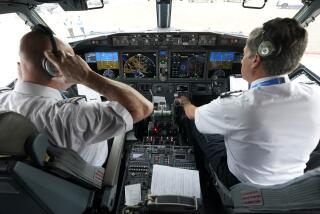I started out to be a physicist....
- Share via
I started out to be a physicist. My dad got me interested because he was a physics teacher. Lacking any other idea what to do with my life, I thought I’d go into physics. But I had three years in the Army during World War II, and during that time I had ample time to reconsider and see the world.
I was about 19 when I decided to enter psychiatry. In the Army I ran into all these strange people. I recall there were some psychiatric casualties. It piqued my curiousity, and I decided this was what I was going to do.
In addition to my work with the (Vista Hill) foundation, I started working with airline pilots about 12 years ago. Prior to the mid-’70s, a pilot who had one of a series of medical disorders was not qualified to fly. It was a lifetime disqualification. Some of the categories included coronary heart disease, epilepsy, mental illness and alcoholism. The result was that, unless a pilot got quite seriously impaired, his colleagues and family were very reluctant to say anything about it, because it would mean the end of his career. For a pilot, being a flier is more than a job. It is often the fulfillment of childhood dreams.
So there were people who shouldn’t have been flying but who were hiding their disability. At that time, a joint project was established between the FAA, the Air Line Pilots Assn. and almost all the major carriers. An agreement was made that, if a pilot was identified with an alcohol or drug problem, he would lose his license as required by law, but he would be allowed, after rehabilitation, to seek a special issuance license which would allow him to return to a regular flying position. This allowed pilots to come out in the open. They would now be reported by family members and co-workers, and now there was a chance to get treatment and go back to flying. I was asked to participate in this program.
It’s a very thorough evaluation with psychological testing, and I write a rather lengthy report. The information is then sent to the FAA, which makes the decision whether to give the special issuance. Assuming they’re reinstated, pilots then go through a period of monitoring for at least two years and as long as five years.
The decision is not any easy one. It has to be based upon a very different set of criteria than you’d use normally. Normally, your orientation as a doctor is what’s best for my patient. Here the criterion is public safety. Essentially you are asking yourself, “Do I want to ride in the back of that plane with them?”--because generally the decision I give is the one the FAA makes about reinstatement.
Sometime the recommendation is not pass or fail. Rather it is, let’s wait a while. Usually the delay would be because the period of sobriety has been too short. Or, the other reason is that, based on my examination and the findings from the psychologist, we think there is some evidence of continuing brain dysfunction.
For most people in most jobs it wouldn’t make any difference. But we’re talking about something a little more vital. Then we’ll ask that they wait a while because we know from experience that alcohol does cause brain dysfunction, and it can be quite prolonged.
You may have a pilot that seems OK, but you notice the way he responds to questions and his reasoning doesn’t seem to be compatible with his intelligence. You can give them some number questions, and they’ll say, “Well, I never was any good at arithmetic.” Well heck, the guy is flying an airplane. He better be good at arithmetic.
Not uncommonly, the pilot will tell you himself that in hindsight he recognizes the defect. One fellow told me at the time he was fine, he had no troubles at all. But, in looking back, he could remember going out to work on his lawn and not being exactly sure where to find the necessary tools.
They don’t all make it. According to the FAA, the success rate is about 85%, which is very high. If they slip, they go back through the whole system again of losing their license, going through treatment and reevaluation.
Public flight safety is the criterion everyone is looking at. But these pilots are very expensive people, and it is a resource one does not throw away without considerable thought. It is to the advantage of the flying public that we assure ourselves these people are safe as fliers, but also that we not waste resources. Pilots generally do very well. They’re highly motivated people, and they have a lot on the ball to be where they are.


